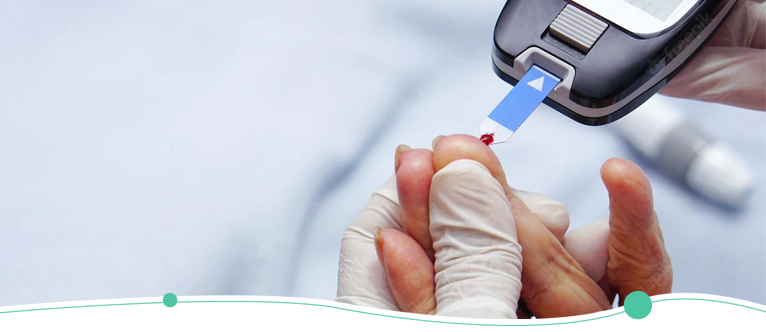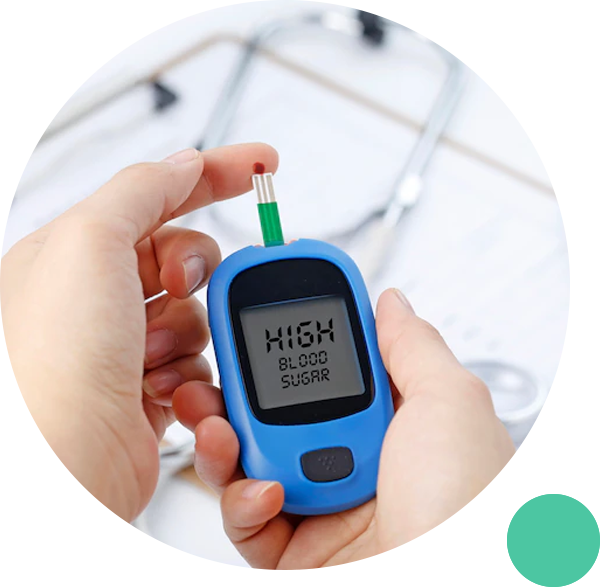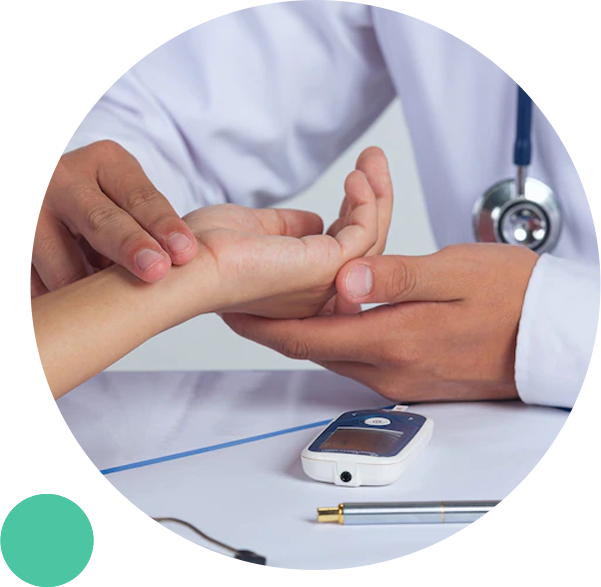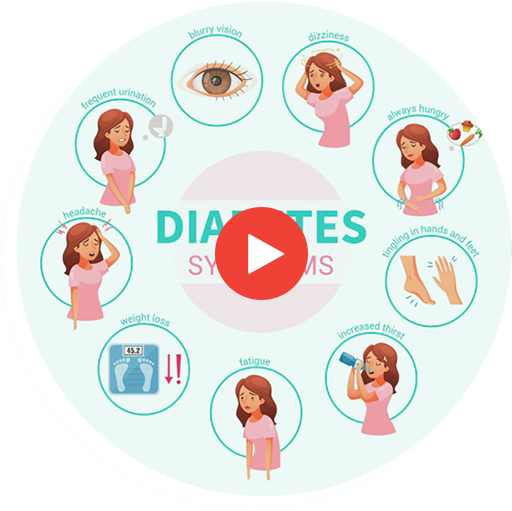
Consult an Online Doctor
For Diabetes Type 2
Medication
Book an Appointment for
Only 
In past, type II diabetes was treated as an adult-onset condition. However, recent data shows that both types I and II diabetes can begin in childhood and adolescence. The latter is more common among older adults but its prevalence is increasing in children and young people with obesity. Though there may not be a complete cure for this long-term condition, lifestyle changes, weight loss and dietary consciousness can manage type II diabetes. Some patients also need medication and insulin therapy when exercise and diet don’t manage blood glucose levels.
TELMDCARE
What is Type II
Diabetes?
Type 2 Diabetes does not allow the body to use insulin the way it should. It's a lifelong disease that affects older and middle-aged people the most. However, obese teens and children are at risk of being affected by Type 2 diabetes. In this medical condition, the body's cells don't accept insulin hormones, leading to excessively high blood sugar levels. This condition impairs the body’s ability to regulate and use glucose (sugar) which is a necessary fuel for the body. This chronic condition causes too much blood sugar circulation which eventually results in immune, circulatory and nervous system disorders. Mainly, two problems occur simultaneously in type II diabetes.
- Pancreas does not produce insulin level – a hormone responsible for regulating sugar in cells.
- Cells don’t respond to insulin, hence, taking in less sugar.
TELMDCARE
Is covered by many popular
insurance plans

TELMDCARE
Symptoms of Type II Diabetes
People with type 2 diabetes might not be aware of the condition until it progresses. However, a few of the symptoms that type 2 diabetes patients report are:
- Feeling thirsty
- Feeling hungry
- Having blurry vision
- Peeing a lot
- Crankiness
- Feeling fatigued
- Feeling a tingling or numbness in your body
- Having a yeast infection that does not go away
- Delayed wound healing
- Losing a lot of weight
- Wound infection
How to Prevent
Type II Diabetes
This chronic condition is greatly preventable if you take simple steps such as:
- Being active and trying to exercise to maintain weight. Inactivity is one of the rising causes of this condition. Work your muscles to improve their ability to absorb glucose and use insulin. This way you can reduce the strain on your insulin-making cells.
- Eating healthy food and avoiding unhealthy diet patterns. Eat whole grain products and skip carbonated and sugary drinks, refined grains and processed carbs. Eat healthy fats and limit processed meat consumption. Eat beans, fish, poultry, beans and nuts.
- Not smoking. Smokers are 50% more at risk of developing type II diabetes than nonsmokers.
However, type II diabetes goes beyond individual behavior. The burden also falls on communities, families, government, media and the food industry to work together in helping people make healthy choices.
Diagnosis
A1C test or glycated hemoglobin test is conducted to diagnose type II diabetes. The blood test determines the average sugar level in the last 2-3 months. The results are interpreted keeping in mind the normal range of 5.7%.
Treatment
Doctors recommend blood glucose tests to check the blood sugar levels in fasting and 2 hours after you have consumed a meal. After the results, your doctor will recommend you treatment and put you on the right medication for your condition. A lifestyle change and medications will help you find a solution, but it is not guaranteed to relieve you from Diabetes and its symptoms. At first, your doctor will ask you to change your lifestyle to see if it affects your blood sugar levels. Most patients are required to:
- Lose weight
- Eat healthy foods and maintain a balanced diet
- Daily exercise
- Monitor your blood sugar levels
Risk Factors That Contribute
to Type II Diabetes
There are certain factors that increase your risk of developing this chronic condition. Such as:
Weight: If you’re obese or overweight, you’re likely to develop type II diabetes.
Inactivity: A sedentary and inactive lifestyle puts you at great risk of type II diabetes.
Physical activity helps with weight control because your body uses glucose for energy. Being
active makes your body’s cells sensitive to insulin.
Fat distribution: If you have more fat around your abdomen – not thighs or hips area – you’re at
greater risk. Men with above 40 inches waist circumference and women with a waist circumference
of 35 inches are more at risk of developing this chronic condition.
Ethnicity and race: unclear, but people of certain ethnicity and race, such as Pacific
Islanders, Native Americans, Hispanic, Black and Asian people are more prone to developing type
II diabetes.
Family history: If your family has a history of type II diabetes, such as your sibling or
parent, you’ll likely be at risk of this condition.
Prediabetes: This condition occurs when the sugar level in the bloodstream is higher than normal
but not enough to be categorized as diabetes. If unaddressed, it can progress to type 2
diabetes.
Besides these risks, age, pregnancy, PCOS, higher blood lipid levels, and darkened areas in the
neck and armpits also indicate insulin resistance and type II diabetes.

Medication services available 24/7 for adults and kids (3+)
Top quality, board-certified doctors
No insurance needed
Same-day prescriptions available*
*Prescriptions provided at doctor’s discretion.
TELMDCARE
As Seen On


Consult an Online Doctor For
Diabetes Type 2 Medication and Treatment
If you're experiencing any of these symptoms, you need to get a doctor's appointment for a diabetes consultation. If you have rashes around the neck or any part of the body that does not go away, it might also be a symptom of type 2 diabetes, and you need to get yourself checked immediately.
At TelMDCare, our online doctors provide you with a consultation and recommend lifestyle changes and medication after your Type 2 Diabetes diagnosis. Moreover, patients can easily schedule a follow-up session with our online doctors for their medical issues. Talk to our telemedicine doctor for type II diabetes meditation.

TELMEDCARE
What we treat
We treat a variety of acute and chronic conditions and provide expert medical advice and guidance for our patients.
Read More
TELMDCARE
Sign Up
Our best online doctors on call ensure that the services we provide are adequate, high quality,
and affordable.
Get in touch with us today for more details or Sign Up for a quick consultation.
$43 SIGN UP
TELMDCARE
FAQS About Type II Diabetes
You can control and lower type II diabetes despite your diagnosis by achieving balanced and healthy lifestyle changes. For instance, regular exercise, carbo-hydrated controlled food, well-maintained weight and medication to manage your condition.
Insulin is a hormone produced in the pancreas. This hormone works by regulating how your body uses sugar. When you eat a meal, insulin releases in the body to raise blood glucose levels. It stimulates glucose uptake in the cells and lowers the sugar level in the bloodstream.
This is a long-term condition that doesn’t change. However, diabetes means “higher blood sugar” so when your sugar level is normal without treatment, you can consider it gone. Please note that this genetic condition always exists even when your sugar level is controlled so you can go back to your old ways.
Over 30% of people living with this condition require insulin therapy while others can take medication to prevent or delays insulin therapy. Studies estimate that the need for insulin replacements will decline in future.
Yes. If you have type II diabetes, it puts your children at risk of developing this condition because it’s a genetic condition. The risk multiplies if your kids are obese or overweight, live a sedentary life and multiple family members have diabetes. Children are 10-15% more likely to develop type II diabetes if their parents have this condition.
No. Insulin therapy doesn’t mean you will develop type I diabetes. The type of diabetes you develop depends on genetics, not the type of medication or therapy you take.



